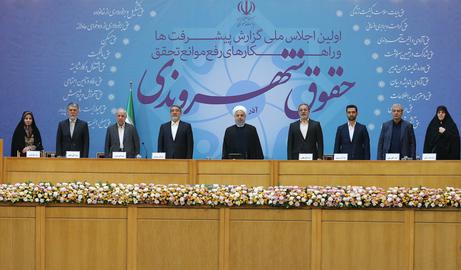President Rouhani’s Citizenship Rights Charter will only survive if all three branches of government, provincial governments and related institutions work together to ensure its aims are realized, a new study by the government reports. But the study also indicates that most institutions under the direct supervision of Iran's Supreme Leader Ayatollah Ali Khamenei have not cooperated with the report's researchers.
The charter sets out citizens’ rights, including the right to life and to “good health” and the right to cultural, ethnic, religious and linguistic freedoms, and was a cornerstone of President Hassan Rouhani’s election campaign back in 2013. The president officially launched the charter on December 19, 2016, but it has never been effectively implemented, despite appeals from civil society activists and campaigners.
According to a report by the President’s Office for Citizenship Rights Affairs, without the full cooperation of the judiciary, the Revolutionary Guards, the Supreme Leader’s representatives, Friday Prayers leaders and the police, the realization of the Citizenship Rights Charter “faces various challenges.”
The 139-page analysis, “Citizenship Rights: Advances and Ways to Overcome Obstacles to its Realization” [Persian PDF], is based on reports submitted by several ministries and provincial administrations. It concludes that, without the cooperation of institutions and agencies that are mostly supervised by the Supreme Leader Ayatollah Khamenei, none of Iran’s provincial governments have much hope of delivering the charter’s pledges.
“The powers granted to provincial governments and organizations that belong to the executive branch depend on [the actions] of other state institutions, be it the judiciary, the armed forces, representatives of the Supreme Leader and the Friday Prayer leaders in each province,” the report outlines.
In such an environment and within the current administrative structure, it adds, local progress cannot be expected if other state entities within the provinces are not instructed to help and cooperate by providing guidance from the top of their hierarchies at a national level. In other words, the analysis sets out that since Ayatollah Khamenei officially oversees all the bodies and institutes in charge of implementing the charter, it can only be successful with his support. If not, obstruction of the charter will continue at every level.
Not Up-to-Date
The study also criticizes some provincial governments because, even though they were required to submit their own reports on the progress of the charter’s aims on an annual basis, in many of the reports, the province has not been specific about the timeframe covered, and the majority of these reports refer to the period before President Rouhani’s second term, which began in August 1917. And the report adds that not a single province has achieved the necessary “theoretical and practical” level of understanding and implementation of the charter. Provincial administrations have missed the “technical intricacies” and importance of the charter.
Furthermore, the presidential office says that the individual reports from provincial governments do not make it “possible to know how well citizenship rights have been guaranteed and how well the people are satisfied with the observance of their rights.” The reports make scant references to special actions provincial governments have taken to support vulnerable groups, so no further information was available for the government-led analysis.
“Perhaps,” the assessment says, “the authors of the reports did not know that besides taking actions to safeguard the rights of all citizens they must also pay attention to compensatory measures for vulnerable individuals and report them separately.” However, the research stops short of defining what it means by “vulnerable individuals” or “compensatory measures.”
Religious Minorities Worse Off
Human rights groups and some areas of the media have been more upfront in their assessment of the situation. They report that the human rights of residents of many Iranian cities are systematically violated and that there is no clear record of President Rouhani’s government improving the situation. On the contrary, members of religious minorities say that after Rouhani became president, pressures on them and discrimination against them have worsened. Ethnic minorities have done better in certain areas, but a considerable number of their demands remain unfulfilled.
“Most provincial governments have referred to consistent efforts to end gender discrimination at the management level or to actions taken to support ethnic and religious minorities in provinces such as Sistan and Baluchistan, Kermanshah and Kurdistan,” says the analysis. During the six years of Rouhani’s presidency, a number of women have been appointed to mid-level positions in provincial governments, but conservatives and some high-level religious authorities have constantly opposed and criticized such appointments.
“In their reports, close to one-third of the provincial governments made no mention of challenges ahead for observing citizenship rights in their provinces,” the report reads, “and, where they have done so, sometimes their definitions are inexact and too general.”
More on President Rouhani’s Citizenship Rights Charter:
What Good is Rouhani's Citizens’ Rights Charter?, December 20, 2016
Ayatollah Mesbah Yazdi: “Equal Rights for the Baha'is and the Jews are Against Islam”, March 3, 2014
Interview with Nazila Ghanea, January 9, 2014
The Iranian Charter of Citizens’ Rights, December 10, 2013
The Citizenship Rights Charter: Elegant But Useless, November 28, 2013
visit the accountability section
In this section of Iran Wire, you can contact the officials and launch your campaign for various problems


























comments